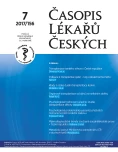Psychological evaluation of uterus transplantation trial participants
Authors:
Roman Chmel 1,2; Zlatko Pastor 1; Marta Nováčková 1,2; Jan Matěcha 1; Miloš Čekal 1; Renata Zámečníková 2; Jiří Froněk 1,2
Authors‘ workplace:
Gynekologicko-porodnická klinika 2. LF UK a FN Motol, Praha
1; Klinika transplantační chirurgie, IKEM, Praha
2
Published in:
Čas. Lék. čes. 2017; 156: 374-378
Category:
Original Article
Overview
Uterus transplantation is a life-giving and quality-of-life enhancing transplantation. Life with transplanted uterus is a transitional phase of life for both recipients and their partners. Six deliveries of healthy children from five transplanted mothers out of 9 uterus transplantations in Sweden may encourage untimely hopes of thousands of women with absolute uterine factor infertility worldwide.
Psychological evaluation might be included into all trials regarding new treatment methods and treatment procedures. Main psychological issues connected with the infertility treatment in women with absent uterus are clearly defined (especially in vitro fertilization, uterus transplantation, compliance with immunosuppressive treatment, ultrasound examinations of uterine vascular perfusion, rejection signs surveillance, embryo transfer, pregnancy, cesarean section, preterm delivery risk, puerperium, hysterectomy and immunosuppressive treatment termination).
The role of psychological evaluation of participants before the admission to complicated treatment process is to choose those who will be able to cope all mentioned difficulties and unexpected complications including potential failure of the whole treatment without serious negative impact on their psychological situation. Up to now experience with psychological stability of our 7 uterus recipients and 3 uterus living donors are good although post-transplant period is especially in recipients connected with everyday psychological adaptation on the significant life changes. We are aware that psychological evaluation of our study participants will require further 3 years of follow up with publication of our results.
Keywords:
uterus transplantation, infertility, psychology, psychological evaluation, pregnancy, quality of life
Sources
1. Brännström M, Johannesson L, Bokström H et al. Livebirth after uterus transplantation. Lancet 2015; 385 : 607–616.
2. Dahm-Kähler P, Diaz-Garcia C, Brännström M. Human uterus transplantation in focus. Br Med Bull 2016; 117 : 69–78.
3. Brännström M, Bokström H, Dahm-Kähler P et al. One uterus bridging three generations: first live birth after mother-to-daughter uterus transplantation. Fertil Steril 2016; 106 : 261–266.
4. Brännström M. Uterus transplantation. Curr Opin Organ Transplant 2015; 20 : 621–628.
5. Hu W, Lu J, Zhang L et al. A preliminary report of penile transplantation. Eur Urol 2006; 50 : 851–853.
6. Petruzzo P, Dubernard JM. World experience after more than a decade of clinical hand transplantation: update on the French program. Hand Clin 2011; 27 : 411–416.
7. Saso S, Bracewell-Milnes T, Ismail L et al. Psychological assessment tool for patients diagnosed with absolute uterine factor infertility and planning to undergo uterine transplantation. J Obstet Gynaecol 2014; 34 : 504–507.
8. Saso S, Clarke A, Bracewell-Milnes T et al. Psychological issues associated with absolute uterine factor infertility and attitudes of patients toward uterine transplantation. Prog Transplant 2016; 26 : 28–39.
9. Clarke A, Butler PE. The psychological management of facial transplantation. Expert Rev Neurother 2009; 9 : 1087–1100.
10. Järvholm S, Johannesson L, Brännström M. Psychological aspects in pre-transplantation assessments of patients prior entering the first uterus transplantation. Acta Obstet Gynecol Scand 2015; 94 : 1035–1038.
11. Järvholm S, Johannesson L, Clarke A, Brännström M. Uterus transplantation trial: Psychological evaluation of recipients and partners during the post-transplantation year. Fertil Steril 2015; 104 : 1010–1015.
12. Kumnig M, Jowsey-Gregoire SG. Key psychosocial challenges in vascularized composite allotransplantation. World J Transplant 2016; 6 : 91–102.
13. Messersmith EE, Gross CR, Beil CA et al. Satisfaction with life among living kidney donors: a RELIVE study of long-term donor outcomes. Transplantation 2014; 98 : 1294–1300.
14. Dew MA, Butt Z, Humar A, DiMartini AF. Long-term medical and psychosocial outcomes in living liver donors. Am J Transplant 2017; 17 : 880–892.
15. Kvarnström N, Järvholm S, Johannesson L et al. Live donors of the initial observational study of uterus transplantation – Psychological and medical follow up until 1 year after surgery in the 9 cases. Transplantation 2017; 101 : 664–670.
Labels
Addictology Allergology and clinical immunology Angiology Audiology Clinical biochemistry Dermatology & STDs Paediatric gastroenterology Paediatric surgery Paediatric cardiology Paediatric neurology Paediatric ENT Paediatric psychiatry Paediatric rheumatology Diabetology Pharmacy Vascular surgery Pain management Dental HygienistArticle was published in
Journal of Czech Physicians

- Advances in the Treatment of Myasthenia Gravis on the Horizon
- Possibilities of Using Metamizole in the Treatment of Acute Primary Headaches
- Metamizole at a Glance and in Practice – Effective Non-Opioid Analgesic for All Ages
- Metamizole vs. Tramadol in Postoperative Analgesia
- Spasmolytic Effect of Metamizole
-
All articles in this issue
- Intestinal transplantation in Czech Republic
- Indications to liver transplantation
- Pros and cons of dual kidney transplantation
- Psychological evaluation of uterus transplantation trial participants
- Psychological problems of patients who survived cardiac arrest out of hospital
- Current macro-diagnostic trends of forensic medicine in the Czech Republic
- The Guideline on Spiritual Care of the Ministry of Health of the Czech Republic
- Organ transplantation from donors after circulatory death
- Journal of Czech Physicians
- Journal archive
- Current issue
- About the journal
Most read in this issue
- Indications to liver transplantation
- Intestinal transplantation in Czech Republic
- Organ transplantation from donors after circulatory death
- Psychological problems of patients who survived cardiac arrest out of hospital
